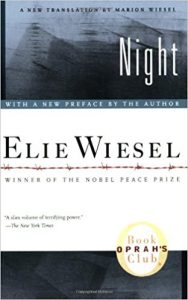
 Literature Guides
Literature Guides
Night Quotes
Quotes and Analysis
Never shall I forget that night, the first night in camp, which has turned my life into one long night, seven times cursed and seven times sealed. Never shall I forget that smoke. Never shall I forget the little faces of the children, whose bodies I saw turned into wreaths of smoke between a silent blue sky. Never shall I forget those flames which consumed my faith forever.
Never shall I forget that nocturnal silence which deprived me, for all eternity, of the desire to live. Never shall I forget those moments which murdered my God and my soul and turned my dreams to dust. Never shall I forget these things, even if I am condemned to live as long as God Himself. Never
Taken from the third section of Night, this passage happens immediately after Eliezer and his father realize that they have made it through the first testing at Birkenau. It is regarded as being the most famous passage from the book. It is also one of the rare times when Eliezer steps away from the continuous narration of his story.
“Where is God? Where is He?” someone behind me asked… For more than half an hour [the child in the noose] stayed there, struggling between life and death, dying in slow agony under our eyes. And we had to look him full in the face. He was still alive when I passed in front of him. His tongue was still red, his eyes were not yet glazed. Behind me, I head the same man asking:
“Where is God now?”
And I heard the voice within me answer him:
“Where is He? Here He is – He is hanging here on this gallows.
Taken from the fourth section, this passage happens as Eliezer bares witness to the painfully slow death of a young boy who had been hanged for conspiring against the Nazis. This moment is used to signify the lowest point in Eliezer’s struggle to keep faith in his God. The child’s death depicts the loss of Eliezer’s own innocence and childhood.
We were masters of nature, master of the world. We had forgotten everything – death, fatigue, our natural needs. Stronger than cold or hunger, stronger than the shots and the desire to die, condemned and wandering, mere numbers, we were the only men on earth.
At last, the morning star appeared in the gray sky. A trail of indeterminate light showed on the horizon. We were exhausted. We were without strength, without illusion.
Happening in the sixth section of the books, as the prisoners run from Buna ends, this passage demonstrates the godless worldview of the prisoners. They have adopted an ‘every man for themselves’ persona and have cast all other morality aside.



